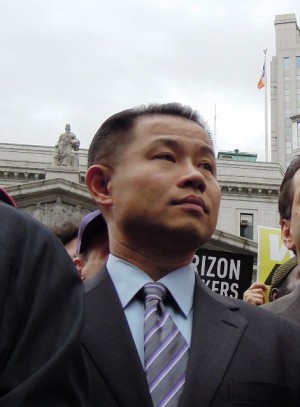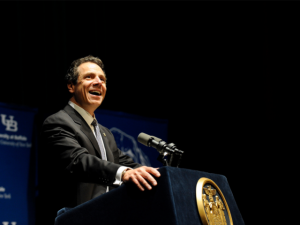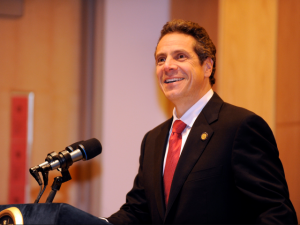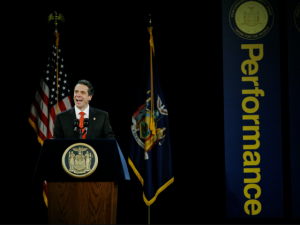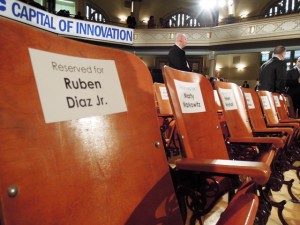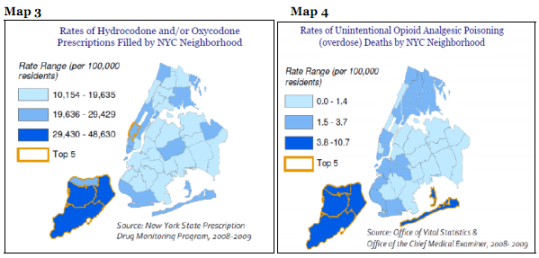Colby Hamilton appears in the following:
Liu's fundraising slowdown is his rivals' gain in 2013 Mayoral race
Wednesday, January 18, 2012
The city and state’s semi-annual campaign finance filings were due this week. In the city, the Mayoral candidates fiscal pictures were the primary focus. As Mirela Iverac reported for WNYC yesterday, City Council speaker Christine Quinn continued to dominate her potential rivals for the Democratic nod. The Speaker is now quickly approaching a point of inertia after becoming the first candidate to raise more than what the campaign finance spending limit during a primary would allow. Quinn’s haul over the last six months was more than $482,000.
But the real story here starts with John Liu, who observers were watching to see how much an impact the fundraising scandal has hurt his efforts. The answer, it seems, is significantly.
'The Capitol Pressroom' with Susan Arbetter
Wednesday, January 18, 2012
 Today on "The Capitol Pressroom":
Today on "The Capitol Pressroom":
Reaction to the Governor's budget address from Majority Leader Dean Skelos.
and
Senator Liz Krueger, ranking Democrat on the Senate Finance Committee
Eric County Republican Senator Pat Gallivan has been pushing an incremental freeze to the local share of Medicaid. We'll hear his thoughts on the Governor's plan.
And how will any shifts from localities to the state be paid for? It's a concern to advocates for long-term care. We speak with Joanne Cunningham of the Home Care Association and Bill Ferris of AARP.
City and state lawmakers weigh in on Cuomo's executive budget proposal
Tuesday, January 17, 2012
Downstate lawmakers, both state legislators and city elected officials, are reacting positively, generally, to Governor Andrew Cuomo’s budget speech given today in Albany. The biggest pieces of the Governor proposed—pension, education and Medicaid reform—took center stage.
They all could have significant impacts on the city's finances and public workforce. The Governor's pension reform would affect all future new public employees, including New York City first responders, while his teacher evaluation proposal could affect the ongoing battle between the city and teachers. And with billions being spent by the city on Medicaid each year, any change in the payment process is significant for the city.
“Governor Cuomo put forward a budget that demonstrates a bold commitment to tackle some of the toughest challenges facing our great state. He has my strong support,” Mayor Michael Bloomberg said in a statement. Bloomberg has been a strong support of much of what the Governor proposed for education and pensions. The Mayor also said he supported Cuomo’s plan to “reduce onerous local Medicaid costs.”
Council Speaker Christine Quinn signaled she, too, supports the Governor’s plan:” This is the strongest state budget that New York City has seen in a long time. With this new budget, Governor Cuomo is establishing a stronger financial basis for a more vibrant and healthy New York.”
Up in Albany, city lawmakers signaled both support and concern for what they heard from Cuomo.
January campaign funds show Skelos dominating fundraising efforts
Tuesday, January 17, 2012
Thanks to Bill Mahoney at NYPIRG for putting this great spreadsheet together.
The state's biannual campaign financial filing deadline is upon us, and the numbers are starting to come in. Rounding out the top-three in money raised the International Union of Operating Engineers education fund, and Senators Saland and Skelos. No one also spent more over the last six months than IUOE. They were followed by Monroe County Republicans and the Transportation Workers Union.
Here's the millionaires club--groups or candidates that had a closing balance of over a million dollars:
$1,086,830.61 -- CITIZENS FOR GULOTTA (former Nassau County Executive Thomas Gulotta)
$1,108,964.90 -- CARRION NYC (former Bronx Borough President Adolofo Carrion)
$1,169,417.40 -- FRIENDS OF DOV HIKIND (Brooklyn Assemblyman Dov Hikind)
$1,422,259.94 -- NEW YORKERS FOR GIANARIS (Queens State Senator Michael Gianaris)
$1,466,131.32 -- VALLONE FOR NEW YORK (New York City Councilman Peter Vallone, Jr.)
$1,810,010.72 -- FRIENDS FOR THE ELECTION OF DEAN SKELOS (Senate Majority Leader Dean Skelos)
This spreadsheet should be updated as new data becomes available. We'd love to know if you find any interesting.
Cuomo's 2012 budget will look to keep the state on track while touching the third rails
Tuesday, January 17, 2012
In today's budget speech we could see Governor Andrew Cuomo expending some of the horde of political capital he continues to pile up.
First and foremost, there's the issue of the approximately $2.1 billion budget gap projected for next year. After restructuring the tax code to include higher-income earners paying more, reports indicate the Governor will again turn to state agencies, asking for a two-and-a-half percent cut across the board.
Then there's the promised four percent increase for both education and healthcare in this budget. Cuomo's already made reforming Medicaid an agenda item in his administration, but appears to have stopped short of the call for the state to take up the call for the state to fully takeover pay for the program.
One of the biggest battles--and seemingly a perennial one--is likely to be over the Governor's call for a teacher evaluation system. This is almost certainly setting up a fight with the state's teachers union.
Another battle between Cuomo and the union's is expected to come from the Governor's proposal for a new pension tier. It's being reported he'll seek a 401(k)-like system for incoming government workers, including first responders.
Another interesting note: the budget won't include money for hydrofracking. Conversations with people working on the issue, some of whom are close with the Cuomo administration, have indicated a growing uneasy with the issue inside the Governor's office. The lack of financing in this coming year indicates that, at the very least, Cuomo is taking a longer, harder look at the process.
As soon as we get our hands on the budget, we'll start digging through to get you important details on the Governor's priorities for the coming year.
'The Capital Pressroom' with Susan Arbetter
Tuesday, January 17, 2012
 Today on "The Capitol Pressroom":
Today on "The Capitol Pressroom":
Andrew Cuomo knows how to generate political capital and use it sparingly. According to state financing expert Robert Ward of the Rockefeller Institute, last year the Governor "didn't use the extraordinary language--in-appropriations powers" created by Robert Megna and used by former Governor David Paterson, "but still achieved an incredible array of successes". Today, Ward joins us with analysis of the budget process and Cuomo's expert use of it.
Larry Levy, Executive Dean at Hofstra's National Center for Suburban Studies, will be here with analysis of what the particular demographics around the state want to hear from the budget.
Pentecostal preacher & the lone standing member of the 4 Amigos, Senator Ruben Diaz is a well-known contrarian who stands firmly against the Governor's call for expanded casino gambling. He will share his budget views with us.
And we meet Tom Allon, CEO of Manhattan Media, which publishes City & State Allon was picked by the Liberal Party to run as their candidate for NYC Mayor in 2013. The Liberal Party has been dormant for a while, not running any candidates for either state or citywide office since 2005.
Cuomo receives record high job approval, but voters think Aqueduct plan stinks: Siena
Monday, January 16, 2012
Just when you thought Governor Andrew Cuomo couldn't get any more popular, a new Siena Research Institute polls shows he's done just that.
"At 73-20 percent, Cuomo's favorability rating is the best it has been since April, and his 62-37 percent job performance rating is by far the best it‟s ever been,” said Siena pollster Steven Greenberg in a statement.
To go along with the love affair voters appear to have with Cuomo, he's also managed to get a majority of New Yorkers--albeit a slim one at 51 percent--to believe Albany is considerably less dysfunctional in his first year in office.
Among the Governor's legislative agenda items from his State of the State speech earlier this month, the creation of an education reform commission received the most support with 82 percent of those polled saying they support the plan.
Only 53 percent of voters said they support the Vegas-style gambling legalization the Governor is in favor of having in New York.
The Governor's proposal to build the country's largest convention center adjacent to the Aqueduct racino in Queens received the most opposition from voters, with 57 percent saying the oppose the plan.
“At this point there is strong opposition to the Governor‟s proposal for a new convention center adjacent to the Aqueduct racetrack and racino," Greenberg said. "New York City voters are barely supportive, suburbanites are opposed and upstaters are strongly opposed. Clearly, the Governor has his work cut out for him to convince voters on that proposal.”
The poll was taken between January 8 and 12, and surveyed 805 New York State Registered Voters. It has a plus or minus of 3.5 percent.
Councilman Lew Fidler to announce State Senate bid Monday
Friday, January 13, 2012
Another announcement that surprises no one: City Councilman Lew Fidler will announce his campaign for State Senate on Monday. He'll be running in a special election to fill the seat vacated by former Senator Carl Kruger.
The election is on March 20.
Council Speaker Quinn announces living wage bill
Friday, January 13, 2012
Below are the Speaker's remarks announcing the agreement. Additional reactions are included after:
For the past year, we have had a debate in the City Council about how to bring more jobs to New York in a way that raises salaries and does not stagnate job growth.
Some have said we should do that by letting the market run its course. Some have said that we should do it by replicating what many major cities in America have done: place a wage requirement on any jobs that are developed through public subsidies. Others have said we should go a step further and put that same requirement on tenants of developments that are built with public subsidies.
I want to thank everyone who has offered support, opposition, data, agreement and disagreement on all three of these perspectives. This has been a worthy debate.
There is nothing more important for government right now than the work of creating and retaining the best jobs we can.
Expectations run high for education, health care in Cuomo's budget
Friday, January 13, 2012
By Karen DeWitt, New York State Public Radio Capital Bureau Chief
Governor Andrew Cuomo is set to release his state budget plan on Tuesday. He will have the challenge of closing a $2 billion dollar budget gap.
But the good news is, it’s far less than last year’s $10 billion dollar gap. It’s smaller than it was projected to be as recently as a month ago. That’s because Cuomo and lawmakers in December struck a deal on major changes to the state’s tax code. The changes will bring an estimated $1.5 billion in additional revenue.
The bad news, for Cuomo, is that he does not have lot of options to close the gap. He’s already said he does not want to raise taxes. Yet he’s holding to a commitment to increase spending on schools and health care by four percent in the new budget.
Assemblyman Jeffries to announce House bid this Sunday
Friday, January 13, 2012
It isn't a big surprise but it's a big announcement: Brooklyn Assemblyman Hakeem Jeffries is officially launching his campaign for Congress in the 10th district this Sunday. The official invite is below.
Jeffries will officially be joining Councilman Charles Barron as a challenger to the man that currently holds the office, Congressman Ed Towns.
Some of the best reporting on Jeffries move towards running has been done by Reid Pillifant at Capital New York--definitely worth a review.
One of the most interesting things moving forward will be to see how redistricting--which will increase the size of the 10th by tens of thousands of voters--will affect the race. We'll be checking in on that as soon as the maps become available.
Council Speaker Quinn to announce living wage deal at 2:30 pm
Friday, January 13, 2012
We'll have details as they come in.
Councilman Williams: Bloomberg's speech reaches "lowest possible bar" with police reforms
Friday, January 13, 2012
There were plenty of things Mayor Michael Bloomberg wasn't going to address in his speech. The past year hasn't been a great one for the NYPD, and it was safe to assume Bloomberg would stay away from issues of police abuse in his State of the City address.
But that doesn't mean other city elected officials were happy about it.
[T]he only fleeting mention of police accountability was a line about increasing staffing at the Commission to Combat Police Corruption; while this is positive, it represents the lowest possible bar for which he could have reached," said City Councilman Jumaane Williams in a statement. "There was nothing on stop, question and frisk, nothing on surveillance of Muslim communities, nothing on anything of real substance to this crucial conversation.
"Make no mistake, this is a direct slap in the face to over half of New York City and its City Council."
Williams has been a vocal critic of NYPD procedures and actions since being arrested back in the summer during the West Indian Day Parade in Brooklyn. In his statement, he did go on to praise the Mayor for two specific portions of his speech: his support for raising the minimum wage and the Dream Act.
'The Capitol Pressroom' with Susan Arbetter
Friday, January 13, 2012
 Today on "The Capitol Pressroom":
Today on "The Capitol Pressroom":
Capital Tonight’s Liz Benjamin & the NY Daily News’ Glenn Blain on what we should be looking for in Tuesday’s budget address. Also, if I can convince them, we will share our most embarrassing moments while covering state government in Albany.
While New York City now has mandated sex ed in public schools, the Shenendehowa School District in Saratoga County recently discontinued its sex ed program taught by Planned Parenthood. As Seinfeld would say, ‘What’s the deal with Sex Ed?” We’ll speak with Tracey Brooks, President & CEO of Family Planning Advocates of NYS & the Reverend Larry Phillips, pastor of Emmanuel Friedens Church in Schenectady, and a member of the Concerned Clergy for Choice.
And former State Assemblyman Michael Benjamin has been an outspoken critic of mandated sex ed in NYC schools. He joins us with another perspective on this upstate district’s recent decision.
Future mayor hopefuls (mostly) criticize Bloomberg's State of the City
Thursday, January 12, 2012
After Mayor Michael Bloomberg’s State of the City speech at Morris High School auditorium this afternoon, elected officials began giving their post-speech reaction on the floor of the emptying auditorium. The mayor’s hard-charging education plans, a new chance for developing the Kingsbridge Armory in the Bronx, and the Mayor’s support for a minimum wage increase were at the top of lawmaker’s minds.
Most of the likely mayoral candidates on hand lined up against the Mayor's educational plans. City Council Speaker Christine Quinn was the exception.
“I think the mayor's five point educational plan is very aggressive,” said Quinn. Education dominated the speech, even as the tone of the Mayor’s speech also turned aggressive towards the teacher’s union. The Speaker went on to say that it's clear this will be a "signature issue over the next 12 months."
Public Advocate Bill de Blasio saw the Mayor’s aggressiveness towards teachers was more like picking a fight.
“A lot of the content he raised was worth looking at and talking about,” de Blasio said. “It’s right to talk about how we make evaluations better, how we make the tenure system better. But why not talk about doing it cooperatively?”
Comptroller John Liu also took issue with the Mayor’s tone towards teachers.
“It was apt that he spent such a large amount of time at the beginning talking about the challenges we still face in our public schools,” Liu said. “[It was] somewhat surprising he spent a good deal of time criticizing teachers and almost throwing down the gauntlet against our teachers.”
The mayor’s education comments weren’t the only hot topics after the speech. Manhattan Borough President Scott Stringer said the Mayor’s support of a state proposal to increase the minimum wage was a step in the right direction.
“The minimum wage proposal is not enough to solve the problems of working families in New York City, but it's a good start,” Stringer said. The minimum wage support and the restart of plans for the Kingsbridge Armory left some with the impression the Mayor was undercutting arguments in the living wage fight. The Borough President said he hoped that wasn’t the case.
“I hope this is a larger strategy to give relief to working people in this city,” Stringer said. “There has to be much more of a concerted effort to deal with the fundamental issues impacting working people.”
Another Borough President, Bronx BP Ruben Diaz, Jr., who had been central to the living wage fight that scuttled the first Kingsbridge development plan, said he didn’t see, nor support, a Kingsbridge proposal that didn’t contain a living wage.
“If you're a developer and you know of the history of the Armory, are you really going to put in a proposal on this [request for proposal] without a living wage,” Diaz asked. “It probably wouldn't be the smartest thing to do."
Good gov coalition drops 'nonpartisan' from redistricting lingo
Wednesday, January 11, 2012
[Note: NYPIRG's Bill Mahoney left a response in the comments section in reaction to my post. I've added his comments to the very end as a rebuttal.]
Or The Life Cycle of Political Reform
It seems like a well rehearsed script by now:
1. Some insidery government operation is about to get under way, full of anticipated opaque backroom dealings and partisan manipulations.
2. Good government groups, and the political opposition, make a tremendous noise about fairness, openness, and a government for, of, and by the people.
3. The insidery government operation makes noise about doing the right thing. Then they go about doing exactly what everyone was scared they'd do.
4. The political opposition screams bloody murder. And good government groups walk back their rhetoric, talk of compromise, and figure out how to be on the same stage as the insidery government operation folks when the deal gets signed.
The script is entering its fourth and final act for the state's redistricting process. After telling everyone they were interested in fairness and doing things transparently, Senate Republicans--aided and abetted by their colleagues in the Assembly's Democratic majority--last Friday surreptitiously revealed the final piece in the puzzle that will help to keep them in the majority.
This, despite being decisively in the minority when it comes to voter registration. In fact, there are more people now enrolled in no party than enrolled in the Republican Party. Likewise, across the state, Democratic Senate candidates, taken as whole, got almost 500,000 votes than their collective counterparts in the last Senate election cycle.
These are just facts.
But so is this: unless Governor Andrew Cuomo or a judge intervenes, New York's State Senate will have 63 seats next year, and they will be drawn in such a way as to protect the minority majority Senate Republicans.
DEC Commish Marten's remarks on hydrofracking comment period closing
Wednesday, January 11, 2012
Below is the full letter from DEC Commissioner Joe Martens on the end of the comment period on the state's draft hydrofracking regulations.
As others have pointed out, the last two paragraphs could signal a move by Martens to allay concerns about the speed at which the department was moving. I've highlighted the lines some are reading as good signs for opponents of the drilling process:
There has been an unprecedented response to this issue with tens of thousands of comments submitted. All comments are being carefully considered as we develop the final rules and conditions for high-volume hydraulic fracturing. In addition, the final documents will include responses to the comments in responsiveness summaries.
DEC has carefully studied this issue for nearly four years and we continue to study each and every issue associated with this activity. DEC’s number one priority is to ensure conditions for high-volume hydraulic fracturing fully protect public health and the environment. If high-volume hydraulic fracturing moves forward in New York, it will move forward with the strictest standards in the nation to ensure New York’s drinking water and other natural resources are thoroughly protected.
Public input is an important part of establishing responsible conditions for high-volume hydraulic fracturing as well as determining whether it can be done safely. Many significant improvements were made to the 2009 draft based on comments DEC received. We expect additional improvements will be made to the 2011 draft based on the comments submitted during this comment period.
Senate memo for 63rd seat doesn't calculate prisoner shift
Wednesday, January 11, 2012
At least that's what Todd Breitbart, the leading technical voice blasting Senate Republicans, appears to have figured out.
According to his analysis, the Republicans' Washington DC-based lawyer Michael Carvin used the data set released back in March:
The population counts shown in his table, "2010 Senate Size Calculation," are from the Census Bureau's March 2010 redistricting data release (the PL94-171 data). These counts - the state total, the 'ratio of apportionment,' the county totals and the figures for the parts of the Bronx - reflect neither the subtraction of the prison populations nor the reallocation of prisoners to their prior home addresses.
Now, this shouldn't be surprising: only at yesterday's LATFOR meeting was the prisoner reallocation issue--though agreed to in principle last month--officially accepted.
Breitbart's point--and I'm sure we'll see this increasingly from Senate Democrats--is that the Senate Republican argument that the method used to get to 62 seats in 2002 is the exact same used to get to 63 in 2012 is called into question. If that were the case, why wait until January 2012 when you could have done the work back in March and settled the issue then?
The assumption that's fueling Senate Ds' criticism is that the math to get to 63 wasn't settled back in March, just the desire to do so.
I'll try and follow up with Senator Nozzolio today to check on this, as well as their lawyer Michael Carvin.
'The Capitol Pressroom' with Susan Arbetter
Wednesday, January 11, 2012
 Today on "The Capitol Pressroom":
Today on "The Capitol Pressroom":
We discuss two related energy topics the Governor is pursuing – the closure of Indian Point and the development of an energy highway from Canada.
Last week Senate Energy Committee Chairman George Maziarz told us he does not support a pipeline carrying power from Canada to downstate; he would rather see any energy transported from point A to point B (NYC & surrounding counties) to be generated by New York State. Today we take the pulse of the Assembly Energy Committee Chairman Kevin Cahill on the issue.
Transmission Developers is the company behind the Champlain Hudson Power Express, a 2 billion dollar project that will bring up to 1,000 megawatts (MW) of clean wind and hydro power to the New York metro area. The pipeline if built would largely be underground, running from Ontario, under Lake Champlain, and along the Hudson River.Transmission Developers VP Bill Helmer will be here with reaction to Senator Maziarz negative feelings about his project, as well as some thoughts on why this plan is the one NY should bank on for its future energy needs.
Speaking of energy needs, if the Governor succeeds in shutting down the Indian Point nuclear complex in the Hudson Valley -- which the City of New York depends upon for over 30 percent of its power -- he’s going to have to replace it with something. Indian Point spokesman Jerry Nappi will share why he thinks any replacement – even hydro from Canada – will be too costly.
And finally, one of the big unions involved in this debate weighs in. Phil Wilcox of the International Brotherhood of Electrical Workers (IBEW) shares his thoughts.
AG Schneiderman report calls for Rx drug abuse tracking system
Wednesday, January 11, 2012
New York's Attorney General Eric Schneiderman released a report today on what he described as a prescription drug abuse epidemic, calling on the legislature to pass his bill that would create a prescription drug tracking system for the state.
“The prescription drug abuse crisis in New York and across the country has reached epidemic proportions. Today’s report illustrates how this growing problem demands a better solution for both our health care providers and law enforcement officials to track the flow of potentially dangerous substances. Inaction is not an option,” Schneiderman said in a statement.
According to the report, the number of prescriptions for all narcotic painkillers has increased from 16.6 million in 2007 to nearly 22.5 million in 2010. A number of locations were highlighted for the growing problem they face, including Nassau County, where overdoses from painkillers more than tripled between 2004 and 2009.
Additionally, in the North Country region, the report says, prescription drug abuse rehab admissions have eclipsed heroine, cocaine and marijuana in some areas. Back here in the city, Staten Island remains the highest prescription-writing borough in the city, as well as the highest overdose borough in the city when it comes to prescription painkillers.
The Attorney General is calling for the passage of his bill, called the Internet System for Tracking Over-Prescribing Act (I-STOP), which would, according to the AG's office:
- requires the Department of Health to establish and maintain an online, real-time controlled substance reporting system to track the prescription and dispensing of controlled substances;
- requires practitioners to review a patient's controlled substance prescription history on the system prior to prescribing;
- requires practitioners or their agents to report a prescription for such controlled substances to the system at the time of issuance;
- requires pharmacists to review the system to confirm the person presenting such a prescription possesses a legitimate prescription prior to dispensing such substance; and
- requires pharmacists or their agents to report dispensation of such prescriptions.
“A statewide database that tracks the disbursement of prescription narcotics in real-time...would be a tremendous tool to help those of us in law enforcement and the medical community combat the scourge of prescription drug abuse,” Staten Island's district attorney, Dan Donovan, said in a statement.
The full report's after the jump.
